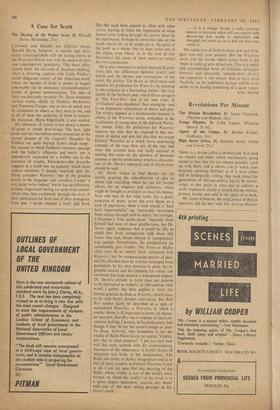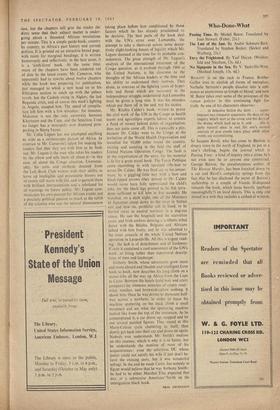Revolutions Per Minute
The African Revolution. By James Cameron. (Thames and Hudson, 18s.)
Agony of the Congo. By Ritchie Calder. (Gollancz, 16s.)
THERE is a device called a stroboscope. It is used on wheels and other rotary mechanisms going round so fast that the eye cannot possibly catch up with them, and it allows you to watch your furiously spinning flywheel as if it were either still or lethargically rolling. Any book about the generalities of African politics has to be strobo- scopic at this point in time, but to achieve a really impressive clarity it should also be written, printed, bound and sold in the space of a week.
Mr. James Cameron, the mild prince of British reporters, did his best with The African Revolu- Lion, but the chapters still give the reader the dizzy sense that their subject matter is under- going about a thousand African revolutions per minute. This is a simple. guide-book, country by country, to Africa's past history and current politics. It is printed on an attractive broad page, with room for marginal headings; it is written humorously and reflectively: in the best sense, it is a `sixth-form' book. At the same time, many of the chapters have been rendered out of date by the latest events. Mr. Cameron, who apparently had to rewrite about twelve chapters while the book was preparing for publication, just managed to whisk a new head on to his Ethiopian section to catch up with the palace revolt, but the Casbah rising in Algiers, the last Buganda crisis, and of course this week's fighting in Angola, escaped him. The speed of compila- tion left him with a few mistakes: for instance, Makerere is not the only university between Khartoum and the Cape, and the Selection Trust no longer has a monopoly over diamond pros- pecting in Sierra Leone.
Mr. Colin L6gum has not attempted anything so wide as a stroboscopic picture of Africa. In contrast to Mr. Cameron's talent for making his readers feel that they are with him as he finds out, Mr. Legum is the man who takes his readers by the elbow and tells them all about rit—in this case, all about the Congo situation. Unmistak- ably, his aims and methods descend from the Left Book Club writers with their ability to 'serve up intelligible and presentable history out of events still warm with life, and to garnish them with brilliant interpretations and a tabulated list of warnings on future policy. Mr. Legum com- municates his own passion for African events, not a precisely political passion so much as the relish of the scientist who sees the natural phenomenon taking place before him conditioned by those factors which he has already proclaimed to be decisive. The best parts of the book deal with the UN's error over, Lumumba, the attempt to take a short-cut across some decep- tively slight-looking fences of legality which Mr. Legum damned at the time for its probable con- sequences. The great strength of Mr. Legum's analysis of the international treatment of the Congo question, as it evolved through 1960 at the United Nations, is his closeness to the thoughts of the African leaders at the time and his ability to understand their motives. They alone, as veterans of the fighting years of hyper- bole and threat which are necessary in the ' independence struggle, understood that Lumumba must be given a long rein. It was his mistakes which put them off in the end, not his tactics.
Mr. Ritchie Calder's book, written to praise the civil work of the UN in the Congo as health teams and agriculture experts labour to contain a flood of misery behind dykes of organisation, does not quite come off. This is especially a pity, because Dr. Calder went to the Congo at the invitation of the World Health Organisation and travelled for 10,000 miles round the country, visiting and assisting in the field the staff of United Nations Operation Congo. The fault is in the organisation of the story. for his material ii fit for a great travel book. The Force Publique came shambling in with upraised rifle-butt to arrest Dr. Calder. He was fired on. to his amuse- ment. by a giggling little boy with a 'bow and black-tipped arrows (they missed or Dr. Calder would never have fully appreciated the child's joke, for the black tips proved to be fish tetra- done sufficient to kill him in five seconds). He watched, on a dark night, one of the Ministers of Equateur creep down to the river in Italian suit and bow tie, portfolio still in hand, to be ferried away to neutral territory in a dug-out canoe. He saw the hospitals and the starvation cases. and Irish soldiers dancing a synthetic tribal dance with the Baluba. Belgians and Africans talked with him freely, and he was admitted to Ihe inner councils of the whole United Nations operation in Leopoldville. All this is urgent read- ing: the luck' is of detachment and of freshness. If only it contained a cool assessment of the UN's work, or living rather than reportorial descrip- tions or men and landscape.
Anthony Smith, whose adventures grow more
and more absurd and likeable and intelligent from book to book, now describes his long climb on a motor-bike all the way up Africa from the Cape to Cairo. Between the hotels (cold beer and crazy company) lay immense stretches of empty road: wind, weather, and brownish-yellow nothing. It shook him. Once he was driven to dismount half- way across a nowhere, in order to leave his machine sputtering on the road. climb a small mountain and see what the sputtering machine looked like from the top of the mountain. As he contemplated it, a car drove up. stopped and let out several puzzled figures. They stared at this Marie-Celeste cycle chattering to itself, then slowly got back into their car and drove on again. Nobody ever understands Mr. Smith's motives on this journey, which is why it is so funny, but he understands the motives of most of his acquaintances: even the solicitous DC whose junior could not satisfy his wife (I just don't be- lieve the ensuing story, but it was wonderful telling). In the end he made Cairo. but nobody in Egypt would believe that he was Anthony Smith : he had to be either Marshal Tito, expected that day, or a subversive American' Smith on the immigration black book.
NEAL ASCHERsoN.











































 Previous page
Previous page